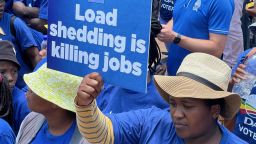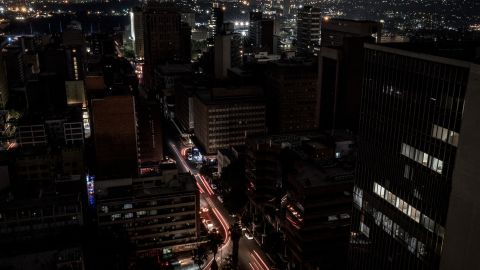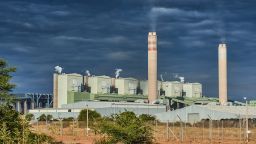When plans for the South African government’s tourism board to sponsor English Premier League club Tottenham Hotspur were leaked and then confirmed last week, they caused widespread public anger.
The controversial sponsorship deal, which has been conditionally approved but not yet finalized, is reported to be around $58 million (R1 billion).
But South Africa is currently in a national crisis, its everyday life paralyzed by a series of daily power blackouts affecting everything from preparing baby formula and policing to powering oxygen machines and preserving dead bodies.

Dead chickens and decomposing bodies: Inside South Africa’s power blackout ‘pandemic’
Known locally as loadshedding, these blackouts are carried out by state-owned energy utility Eskom to avoid the total collapse of the grid and have become so disruptive that President Cyril Ramaphosa is considering declaring a natural disaster.
In this climate, and following the backlash that accompanied the public announcement of the plans, local media reported on Sunday that tourism minister Lindiwe Sisulu is “set to pull the plug” on the deal.
CNN has contacted the Department of Tourism for comment, but had not received a response at the time of publication, and South African Tourism (SAT) who declined to comment.
So, with the country in the middle of a national crisis, why has its tourism board conditionally approved a deal that would direct government money towards one of England’s biggest, and richest, soccer clubs?
‘Help us shift the dial’
Ostensibly, sponsoring Tottenham would help “convert fans and spectators into tourists,” South African Tourism (SAT) said in a statement on February 2, helping to reach the government-mandated goal of 21 million international tourist arrivals by 2030, as the country’s tourism sector recovers from the Covid-19 pandemic.
“We cannot carry on with business as usual, because it will not yield the desired results. This is why we are contemplating a partnership of this scale with Tottenham Hotspurs FC, to really help us shift the dial in our tourist arrivals,” SAT’s acting chief executive officer Themba Khumalo said in the statement.
Tottenham declined to comment on the deal.
The South African tourist industry collapsed during the pandemic with its contribution to the country’s GDP more than halving in 2020 and, while the domestic market has recovered, attracting international tourists back has proved more difficult.

Loadshedding is currently affecting every aspect of South African daily life.Stringer/AFP/Getty Images
Using football sponsorship to boost international tourism is not a new idea. Rwanda controversially began sponsoring Arsenal in 2018, which SAT cites as the reason behind an 8% increase in that country’s tourism numbers.
Meanwhile Malawi’s Ministry of Tourism, Culture & Wildlife signed an agreement last month with Spanish Segunda Division side Club Deportivo Leganes to become one of its rotating main sponsors.
By choosing to sponsor Spurs, SAT hopes to tap into the UK market – the third largest source of international visitors to South Africa – and reach the one billion households around the world who watch the Premier League.
Financial football expert Kieran Maguire tells CNN Sports that a sponsorship arrangement between Spurs and SAT “seems a rather strange relationship,” even as it seeks to capitalize on the Premier League’s global audience.
“You can see the benefits for the football club because they get cash,” he adds. “In terms of the benefits for the countries, less so. Trying to link individual marketing campaigns to a level of success in a measurable way is always difficult.”
Before the plans were finalized, however, they were leaked to South African newspaper The Daily Maverick, drawing public ire.

South Africa tourism in talks to sponsor Tottenham Hotspur amid energy crisis
As the tourism board lamented that the plans had been made public, criticism emerged from various quarters, including within the government itself.
Three members of the South African government’s tourism board – Enver Duminy, Ravi Nadasen and Rosemary Anderson – resigned after the plans were made public.
Even Ramaphosa opposes the deal in its current form, with his spokesperson Vincent Magwenya saying that, “we do not think spending so much money in the manner that is being suggested will be justified,” according to local media outlets such as News24.
CNN has reached out to the President’s office for comment but had not received a response at the time of publication.
‘A misguided vanity project’
Critics of the government, however, offer another explanation for the proposed deal, painting it as an expensive fig leaf while loadshedding affects every aspect of South African daily life and local tourist industries still struggle to recover from the pandemic.
Opposition party Democratic Alliance (DA) criticized the deal, saying that the money could fund more than 33 million liters of fuel to power Eskom, over 10,000 more undergraduate student bursaries and almost 5,000 new police officers, while the Congress of South African Trade Unions lambasted it as a “misguided vanity project.”
Similarly, Manny de Freitas, the DA Shadow Minister of Tourism, called the proposal “another glitz and glamour ploy by Tourism Minister Sisulu, to leave a mark in tourism before the potential redeployment to another department in a soon-to-be announced cabinet reshuffle.”

South Africa’s energy crisis deepens as blackouts hit 12 hours a day
He added that the DA would send a delegation to Spurs this week to ascertain the deal’s status and whether any money had been exchanged.
OUTA, a non-profit organization tackling maladminstration, tax abuse and corruption, called on the government to provide “detailed information and transparency,” and pointed out that the proposed deal seems to contradict SAT’s stated strategy of shifting from a marketing focus to a more robust support of the tourism sector.
“We believe this could be a serious waste of money and abuse of taxpayers’ funds, especially when this decision would consume around 38% of SA Tourism’s marketing budget for the next three to four years,” its CEO Wayne Duvenage said in the statement.
“On top of that, this spend is largely aimed at the UK visitors, which is only around 25% of South Africa’s inbound tourism market.”
As South Africans grapple with the questions surrounding the deal’s approval, political pressure is mounting on those, such as Sisulu, who will ultimately finalize it.


